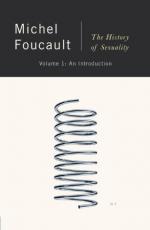
|
| Name: _________________________ | Period: ___________________ |
This quiz consists of 5 multiple choice and 5 short answer questions through Part 4, ,Chapter 1, Objective.
Multiple Choice Questions
1. What were the effects of the power exercised over sexuality in the nineteenth century?
(a) It was successful in making the topic of sexuality taboo.
(b) It created a multiplication of singular sexualities and pleasure power spirals.
(c) It set practicable boundaries for sexuality.
(d) It set up a barrier against sexuality that was too rigid and provoked a backlash.
2. Which of the following is NOT true, according to Foucault, about the treatment of sex in the beginning of the eighteenth century?
(a) It had to be inserted to systems of utility and regulated for the greater good.
(b) It had to be taken charge of by analytical discourse.
(c) It was not to be simply condemned, but managed.
(d) It was almost never spoken of by the educated and moral classes.
3. What does Foucault say distinguishes the last three centuries?
(a) A general prudishness of language.
(b) A uniform concern to hide sex.
(c) Massive censorship.
(d) The wide dispersion of devices and institutions that were invented for speaking about sex.
4. What does Foucault say about people of disparate sexualities from the end of the eighteenth century on?
(a) They were always considered criminals and sent to prisons or labor camps.
(b) They were perceived as the natural consequence to repression.
(c) Their neuroses were considered to be contagious, so they were shunned from society.
(d) They were perceived as scandalous, dangerous victims of disease.
5. What does Foucault refer to as the triple edict of puritanism?
(a) Condemnation, ridicule, and rejection.
(b) Taboo, nonexistance, and silence.
(c) Tolerance, modification, and acceptance.
(d) Shame, repentance, and redemption.
Short Answer Questions
1. What is the central question Foucault wishes to address?
2. Which of the following is NOT true, according to Foucault, about children's sex in the eighteenth century?
3. Which of the following is NOT listed as one of the accepted ways to free oneself from the effects of sexual repression?
4. Which of the following is a statement made by Foucault?
5. What relationship does Foucault give to governmental powers and law?
|
This section contains 486 words (approx. 2 pages at 300 words per page) |

|




